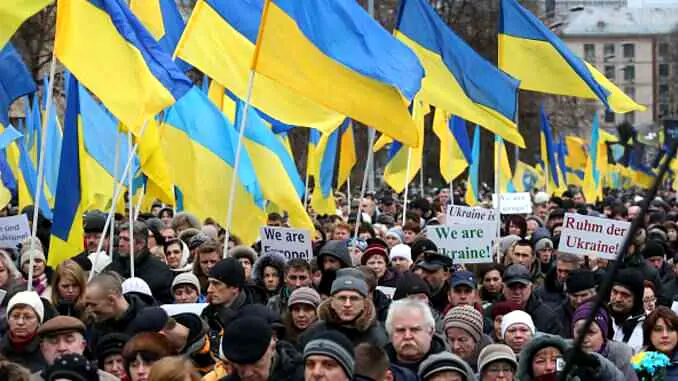Ukraine takes resistance to cyberspace, assembles ‘IT army’ to hack sites from Russia, allies

As Ukraine continues to make efforts to mobilize and equip ordinary citizens on the ground to resist Russia’s unprovoked invasion of the country, those who are outside Ukraine who wants to help are being asked to get involved in the fight in the virtual world.
While the G7 (today with the addition of Japan) mobilize to shut down Russia’s access to the Swift banking system, the country has been running a campaign corralling developers to join an “IT army” tasked with specific cyber challenges. It’s also making specific calls to technology leaders to do their part, too.
The “IT Army of Ukraine“, announced yesterday and already with nearly 184,000 users on its main Telegram channel (and that number is growing – it gained almost 10,000 users in the time I wrote this story), is using that account to name specific projects and call-outs for help to shut down Russian sites, Russian agents and those working in concert with the country, and to mobilize those living in Ukraine around work they can do. (It also has a Gmail address for those not using Telegram: itarmyua@gmail.com. We have reached out to that address to see if the organizers would speak with us more about the project.)
And it seems to be making some progress. A call-out on the channel to shut down the API for Sberbank, one of Russia’s major banks, earlier today appears to have come into play, with the site currently offline. Ditto Belorussia’s official information policy site, which it says was also taken offline after a call out on the channel. It’s taking the tongue-in-cheek approach similar to the one adopted by Anonymous and other activist hacker groups when going after specific targets.
Unbelievable cyberattacks hit Russian governmental services portal, Kremlin, Parliament, First Channel, Aerospace, Railroad websites on February 26th,’” it notes citing Russian media. “‘Fifty plus DDoS-attacks contained over one terabyte capacity.’ Who has done that? 😉 what a pity accident.”
The effort is getting discovered by word of mouth, but also with endorsements from government officials Tweeting out the link. (However it’s not clear that the government is actually behind it.)
“We are creating an IT army. We need digital talents,” Mykhailo Fedorov, who is both Ukraine’s Vice Prime Minister and Minister for Digital Transformation, noted on Twitter. “There will be tasks for everyone. We continue to fight on the cyber front. The first task is on the channel for cyber specialists.”
Fedorov has not been wasting his words on Twitter. He’s also been singling out Mark Zuckerberg and Elon Musk to use their platforms and existing products in aid of the efforts, respectively to ban access to Facebook platforms in Russia, and to extend Starlink access to Ukraine to give users a data backup. Success is a mixed bag: Musk has said the Starlink satellites have been trained over Ukraine now; but the Facebook ask seems to be going a little slower (ads have been banned but it seems access has not been, at least so far).
Fedorov also gave DMarket, where people trade NFTs and other virtual goods, a namecheck for freezing accounts for users from Russia and Belarus, because the proceeds could be used to support their efforts against Ukraine.
The country’s position on cryptocurrency platforms has been pretty bullish overall, with the official Ukraine Twitter account yesterday publicizing addresses to take donations in Bitcoin, Ethereum and Tether (USDT). Many people assumed the account was hacked, although that Tweet has now been pinned and seems serious. Still, in the scramble, there’s no certain information about how those funds would get extracted, and what exactly they would be used to fund.
All of this speaks to how fast things move in tech, and just how much is dependent on it working. It’s an interesting counterpoint to the shutdown of the Swift financial messaging network — which ironically, may not be very Swift in coming, since it will need not just states to take a stand but then for the member institutions — Swift includes some 11,000 banks and other financial services companies across 200 countries — to switch off, too.
“SWIFT is a neutral global cooperative set up and operated for the collective benefit of its community of more than 11,000 institutions in 200 countries. Any decision to impose sanctions on countries or individual entities rests solely with the competent government bodies and applicable legislators. Being incorporated under Belgian law, our obligation is to comply with related EU and Belgian regulation,” Swift said in a statement provided to TechCrunch. “We are aware of the Joint Statement by the leaders of the European Commission, France, Germany, Italy, the United Kingdom, Canada, and the United States in which they state they will implement new measures in the coming days with respect to Russian banks. We are engaging with European authorities to understand the details of the entities that will be subject to the new measures and we are preparing to comply upon legal instruction.”
Make no mistake: losing Swift access is a big deal and will deprive Russia and its companies of being able to transact for buying and selling goods. But the last blockade of this kind was made against Iran and it took years for it to go into full effect,.
“Being banned or removed from Swift would have a definite impact since there are not many alternatives to that point to point network,” Virginie O’Shea, an analyst and founder at fintech consultancy Firebrand Research, told TechCrunch. She noted that Russia had previously tried to set up its own internal network for Russian banks, but it doesn’t extend internationally at this point. “It takes time and hoops to jump through [to set something like Swift up].”
As with Iran, there will be huge implications for other countries, especially those who rely on Russia for products like gas and energy, which is one reason why implementing the Swift resolution might take time to come through. “If you think about it from the perspective of oil and gas, you are hampering paying for those services, so you’d impact those countries as well as Russia.”







